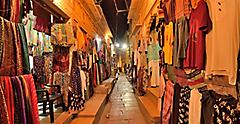How To Haggle In Street Markets As You Travel The World
Travel the World and Haggle Like a Local
By Robert Schrader | Published on April 22, 2022
Today, I may be something of an expert on how to haggle in street markets, but 13 years ago, I was terrified by the idea. As I traveled the world, strolling through the markets of Palolem Beach in Goa, India, with a friend who was much more experienced (at tourism and life) than me. From her I found inspiration, haggling was a game — she actually found it fun!
"It's a skill," she told me as we left one stall and she placed a skirt she got at a rock-bottom price into her bag, which was already overflowing with the rest of her bounty. "The more you do it, the better you get at it."
That day, my friend gave me a crash course in haggling, which I've since put into practice all over the world. With these tips, you'll be confident to haggle, wherever you may travel!
Practice Haggling With Wants, Not Needs

Haggling for something you want is key — you should never haggle for something you need. For example, a captivating cuckoo clock at a Christmas market in Cologne, Germany, is a great target for haggling practice. A pair of pants for the rooftop bar in Bangkok where you brought only shorts because you didn't anticipate a fancy night out? You're probably not going to get the price you want on that one.
When my friend was teaching me about how to haggle in street markets, her first tip was just two words: Walk away. She shared this advice matter-of-factly, as she put down a cute (but not life-changing) top someone wanted to sell for an unfair price. "If they don't give you the price you want, walk away and ignore their calls to the contrary."
Just then, the seller relented. "OK," he conceded. "You can have it for that price."
Haggling for wants, not necessities, allows you to walk away. That assertive behavior usually leads sellers to make dramatic reductions in price in order to make the sale.

Start Your Negotiations Low

I don't remember the exact price she paid that day, but my friend got her top, among other items, for less than half of what the seller originally asked. "The art of haggling," she said as she continued our lesson, "is to start way lower than you expect to pay. Negotiation is a tug of war — if you don't give yourself some leeway, you'll definitely get dragged through the mud."
Therefore, if the seller asks for 200 Indian rupees at the outset, start with offering only 50 rupees. That way, you'll have some wiggle room to negotiate, and when you finally offer 100 rupees, it'll be a good compromise.
Years later, I paid these teachings forward to a fellow traveler as he sought to purchase a rug at the main souk of Marrakesh, Morocco. He was shocked to get it for less than half of the original asking price, but I wasn't. The street vendor played hard — as I suggested he should — and he won!

Bring Cash — Small & Large Bills

Of course, many things you can buy in street markets are everyday apparel and sundries, not expensive home decor. Haggling hinges on the fact that the items are relatively cheap and can be found elsewhere, so the interaction is quick and efficient to satisfy both parties in the transaction. So if you enter a haggling situation, you have to be willing to prepare and put in the work, because an imperfect transaction now is better than a perfect one later.
To ensure the transaction goes smoothly, have plenty of cash on hand. Although an increasing number of vendors now accept digital payments, cash is efficient and easy — and may get you a better deal.
One time I was at a market in Kuala Lumpur, Malaysia, buying a remote control for my camera. I had found a price I couldn't walk away from — although I didn't let the seller know that. Had I not had some Malaysian ringgit with me, I'd have almost certainly lost the deal while I went to find an ATM.
Now, if you do pay cash for something that's important or expensive, make sure to ask for a receipt — just because you got a good deal doesn't mean all bets are off. If the bracelet you buy at a market in Jamaica breaks later that day on the beach, you'll want to have some recourse.
Ask For A Receipt

Remember The Golden Rule Of Haggling With Street Vendors
Asking for a receipt is essential because you want to avoid getting ripped off. On the other hand, be humble. Or as my friend put it when she was teaching me how to haggle in street markets in India, "Remember the Golden Rule of shopping: You get what you pay for. You're not going to get Versace for five bucks! Well, not real Versace."
I put this particular piece of haggling advice to the test after I moved to Shanghai to teach English. I headed to the Nanpu Bridge Fabric Market to curate my new teacher wardrobe. There, I ordered no less than a dozen shirts and vests and cannot have paid more than 100 U.S. dollars.
Although I felt tempted months (and, in a couple cases, weeks) later to take the items back and complain about ripped or itchy seams, I remembered what my friend had told me. These may have been off-label clothes, but they were also ones I'd bought at very cheap prices. I'd gotten what I paid for — it would've been disingenuous to take them back unless I was prepared to pay more to have the flaws corrected.

Be Bold, Yet Mindful

I'm currently in Thailand, a country where I used to live and one that's incredibly important to me. Although my trip has primarily focused on visiting old friends and seeing my favorite vacation places, I've gone out of my way to support local vendors. I purchased a traditional wooden mask at Chiang Mai's Doi Inthanon temple and a hand-drawn postcard from a talented young man on a street corner in Bangkok, but I haven't pushed back much on the asking price. Due to the circumstances of the pandemic, many local people haven't had consistent income, so I've set aside much of my advice on how to haggle with street vendors.
That doesn't mean to let them take advantage of you, but it does mean that you shouldn't be too aggressive. Haggling can be fun, and it's often like a little game between you and the vendor, but keep in mind that they need to make a living.
The art of haggling takes practice so you can find what works and what doesn't. This skill is great for self-contained trips to any given destination. The best use of it, however, is an epic round-the-world trip. After all, I became a great haggler not in the beach markets of Goa, India, nor the fabric markets of Shanghai, China, but as a sum result of those experiences. Plan your next adventure, step out of your comfort zone, and soon you'll be haggling like a pro.





